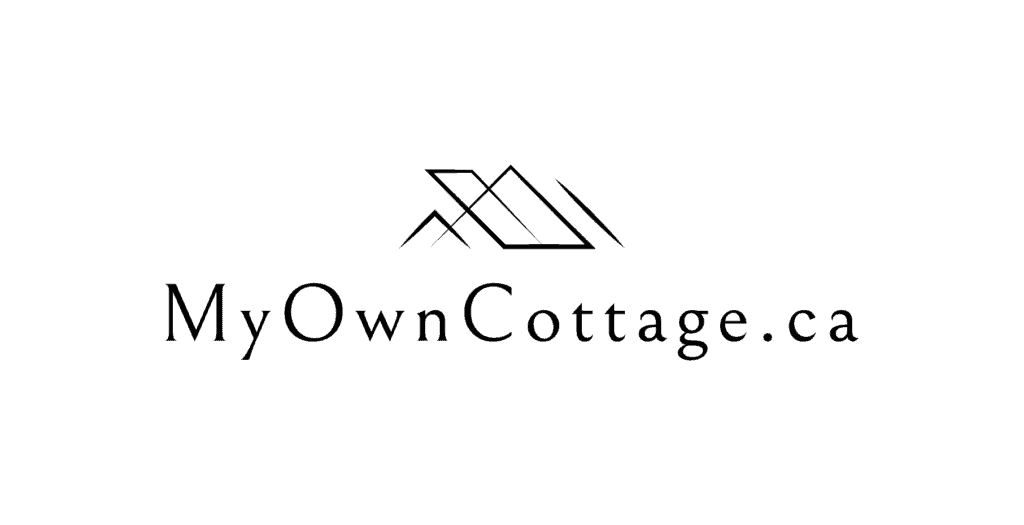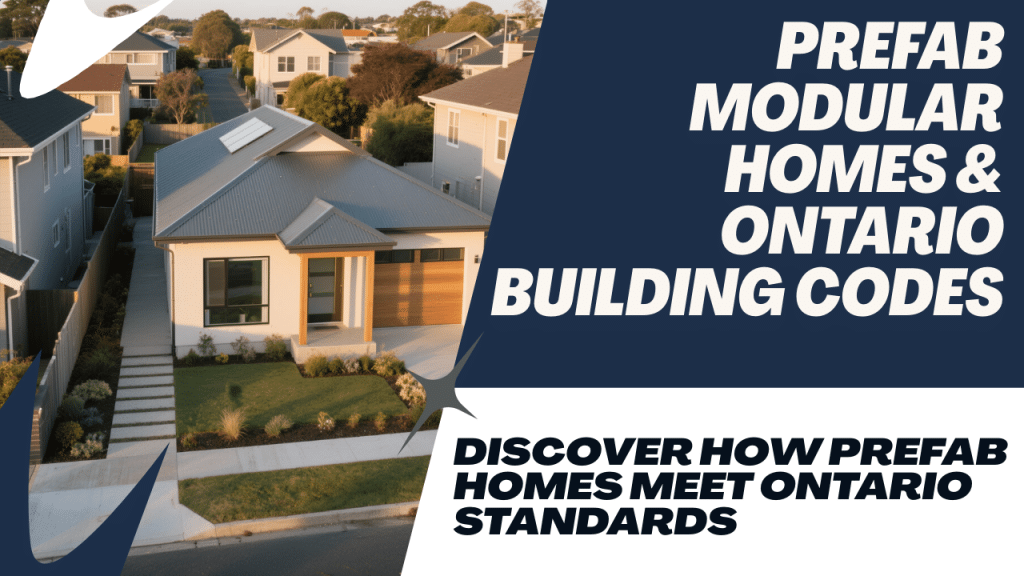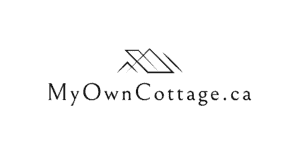How Prefab Modular Homes Meet Ontario Building Codes: A Complete Guide
Last updated: September 4th, 2025
Prefab modular homes in Ontario attract buyers because they offer affordability, faster construction timelines, and sustainable design options.
But before purchasing, many people want clarity on compliance: how do prefab modular homes meet Ontario Building Code (OBC) requirements?
Quick Answer: Prefab Homes and Ontario Building Code Compliance
Prefab modular homes are engineered to meet or exceed Ontario Building Code (OBC) requirements.
From factory-controlled construction to municipal building permits and final inspections, every stage of the process is designed to ensure safety, durability, and full compliance with Ontario’s regulations.
Understanding the Ontario Building Code (OBC)
The Ontario Building Code (OBC) is the province’s primary framework for all construction projects, including prefab modular homes. Its role is to ensure every home meets essential standards for safety, efficiency, and livability.
Under the OBC, both prefab and modular homes in Ontario must demonstrate compliance in key areas:
Structural Safety – Load-bearing walls, roofing systems, and foundations must meet strict engineering requirements.
Energy Efficiency – Homes must comply with insulation, airtightness, and mechanical system standards.
Accessibility – Where applicable, designs must include features that support accessible living.
In short, the OBC serves as Ontario’s baseline for safety and quality. Before occupancy, every prefab modular home must pass inspections to verify Ontario Building Code compliance.
If you’re unsure how these categories differ, you can explore the difference between prefab and modular homes in Ontario to better understand their unique characteristics before looking at compliance requirements.
How Prefab Modular Homes Are Designed to Meet Building Codes
Factory Quality Control & Engineering
Prefab modular homes in Ontario are constructed in CSA-certified factories under the supervision of licensed engineers.
Unlike traditional site-built homes exposed to weather, prefab modular homes benefit from factory-controlled conditions that reduce risks such as warping, water damage, or mold. This process also shortens construction timelines significantly, making them faster to build than traditional homes.
Before leaving the factory, every module must pass third-party inspections to verify compliance with both CSA A277 standards and the Ontario Building Code (OBC). These inspections cover structural integrity, wiring, plumbing, insulation, and energy efficiency requirements.
As one Ottawa homeowner shared: “We were amazed at the level of detail. Inspectors checked everything—from electrical to insulation—before the modules even left the plant.”
Compliance in Transportation & On-Site Assembly
Once prefab modular home modules are transported to the site, they are assembled by licensed Ontario contractors following strict installation guidelines.
During this stage, municipal building inspectors play a critical role in ensuring Ontario Building Code compliance:
Foundations & Anchoring – Inspectors confirm the home is securely placed and structurally sound.
Utility Hookups – Electrical, plumbing, and mechanical connections must meet local code requirements.
On-Site Adjustments – Any modifications, such as electrical panel connections, are inspected and approved before occupancy.
This dual inspection process—factory certification and municipal review—provides homeowners with double assurance of safety, durability, and full Ontario building code compliance.
Energy Efficiency & Green Building Requirements
Ontario’s energy code sets strict standards for efficiency in new housing, and many prefab modular homes are designed to not only meet but often exceed these requirements.
The most popular prefab modular home designs in Ontario ensure style and compliance work together.
Key features include:
High-Performance Insulation – Improves thermal efficiency and lowers heating and cooling costs.
Triple-Pane Windows – Reduce energy loss and enhance year-round comfort.
Airtight Construction Methods – Minimize drafts and increase overall durability.
Some models even achieve Net Zero prefab modular home status in Ontario, meaning they produce as much energy as they consume. This not only reduces a homeowner’s carbon footprint but also delivers long-term savings on utility bills.
These highly efficient designs also highlight how flexible and adaptable prefab construction can be, with many customizable prefab modular homes in Ontario built to match homeowner needs while still meeting strict code requirements.
Common Misconceptions About Ontario Prefab Modular Homes & Building Codes
| Myth | Reality |
|---|---|
| Prefab homes aren’t legal in Ontario | ✅ Prefab modular homes are fully legal and regulated under the OBC |
| Prefab homes don’t pass inspections | ✅ They undergo multiple inspections at factory and municipal levels |
| Prefab means low quality | ✅ CSA standards ensure equal or higher quality than site-built homes |
Sources: Government of Ontario, Canada Mortgage and Housing Corporation (CMHC).
Navigating Local Zoning and Permits
Working With Municipalities
While the Ontario Building Code (OBC) sets standards province-wide, local zoning bylaws determine where and how prefab modular homes can be placed. These municipal rules affect everything from site layout to design approvals.
For example:
Toronto Prefab Modular Home Permits – Often include additional urban design reviews to ensure new homes fit within city planning guidelines.
Smaller Municipalities – May offer faster approval timelines but can require detailed site plan approvals for modular housing projects.
Understanding both the OBC requirements and local zoning bylaws is essential for navigating the Ontario modular home permit process successfully.
Tips for a Smooth Approval Process
To successfully navigate the Ontario modular home permit process, homeowners should plan ahead and work closely with professionals.
Key steps involved in buying a prefab modular home in Ontario include:
Choose a Licensed Modular Home Builder – Partner with an Ontario builder who understands both the Ontario Building Code (OBC) and local zoning bylaws.
Secure Pre-Approval Plans – Submitting complete architectural drawings and site plans upfront helps speed up municipal reviews.
Plan for Timelines – Approval periods typically range from 4 to 12 weeks, depending on the municipality. Larger cities like Toronto may take longer due to additional design reviews, while smaller towns may move faster.
By following these steps, buyers can streamline the permit process and avoid delays in bringing their prefab modular home project to life.
Explore the top-rated prefab modular home builders in Ontario who are experienced in navigating zoning rules and meeting OBC standards.
Benefits of Ontario Code-Compliant Prefab Modular Homes
Beyond simply meeting regulations, a code-compliant prefab modular home in Ontario provides several key advantages:
Peace of Mind – Homes are engineered for long-term durability and safety, ensuring full compliance with the Ontario Building Code (OBC).
Faster Approvals – CSA factory certification often streamlines the municipal inspection and permit process, reducing project delays.
Financial Benefits – Lenders often look more favorably on homes that are CSA-certified and code-compliant. Learn how this can improve your eligibility for mortgages and review financing options for prefab modular homes in Ontario.
In short, compliance with the Ontario prefab modular housing standards guide doesn’t just satisfy regulations—it adds value, efficiency, and security for homeowners.
See how meeting regulations affects prefab modular home costs in Ontario compared to traditional homes.
Conclusion: Prefab Modular Homes in Ontario Built for Full Code Compliance
Prefab modular homes in Ontario are fully legal and designed to meet—often exceed—Ontario Building Code (OBC) requirements.
With rigorous CSA certification, multiple inspection checkpoints, and compliance with Ontario’s energy efficiency standards, they offer a future-ready housing solution that balances safety, sustainability, and affordability.
Ready to start your own build?
Simply book a free consultation, call us directly, or view our design catalogue for further details.
🧑💼 Request a Free Consultation
📲 Call Us Directly: (705) 345-9337
🏘️ View Our Design Catalogue
✅ Ontario-Built | ⚡ Energy-Efficient | 🏡 Fully Customizable | 🚚 Fast Delivery
Alternatively, for your convenience, you can also simply fill out the contact form below and we’ll get back to you soon! 👇
FAQ: How Do Prefab Modular Homes Meet Ontario Building Codes?
What is the Ontario Building Code for Prefab Modular Homes?
The Ontario Building Code (OBC) sets province-wide standards for safety, energy efficiency, and accessibility. Prefab modular homes must meet the same requirements as site-built homes.
How Are Prefab Modular Homes Inspected in Ontario?
Factory Inspections: Accredited third-party inspectors, approved by the Standards Council of Canada, review modules during production.
Municipal Oversight: Local officials may also inspect factories or appoint representatives to verify compliance.
What is CSA A277 Certification for Modular Homes?
CSA A277 certification is a national standard that verifies a factory’s entire construction process complies with building codes. Many Ontario prefab manufacturers use this certification to streamline municipal approvals.
What On-Site Inspections Are Required for Prefab Homes?
Foundation & Anchoring: Inspectors confirm that modules are securely attached to the foundation.
Utilities & Connections: Electrical, plumbing, and sewage hookups are reviewed.
Structural Review: Framing, insulation, and final finishes are inspected before occupancy is granted.
Do Prefab Modular Homes Meet Ontario Building Codes?
Yes. Prefab homes undergo both factory and on-site inspections, ensuring full compliance with the OBC. In fact, many exceed code requirements due to consistent factory quality control.
What Are the Benefits of Factory-Built Homes?
Consistent Quality: Controlled conditions reduce errors.
Efficiency: Faster, more precise builds support better compliance.
Code Confidence: Double inspections (factory + municipal) give buyers peace of mind.
What Reputable Companies Ensure OBC Compliance?
Several modular home builders in Ontario follow CSA A277 certification and work closely with municipal inspectors to ensure full compliance with the Ontario Building Code (OBC).
One example is My Own Cottage, a reputable Ontario prefab builder known for:
Designing CSA-certified modular homes
Guiding homeowners through the permit and zoning process
Offering energy-efficient prefab models that often exceed OBC energy standards
Transparent compliance documentation for peace of mind
By choosing a licensed and experienced builder like My Own Cottage, homeowners can feel confident their modular home will meet — and often exceed — Ontario building code requirements.
🛡️ Verified Third-Party Resources
For added confidence and transparency, here are trusted external sources that support modular homebuilding in Ontario:
Ontario Building Code (O. Reg. 332/12)
Official provincial regulations that govern modular and factory-built homes.Tarion Warranty Corporation
Provides home warranty coverage and builder licensing in Ontario.Canadian Home Builders’ Association (CHBA)
National organization supporting residential construction, modular certification, and best practices.CMHC – Canada Mortgage and Housing Corporation
Federal housing authority offering insights on modular housing affordability, financing, and energy efficiency.Statistics Canada: Housing Data
Data-driven research on Canadian housing trends, ownership, affordability, and construction.


